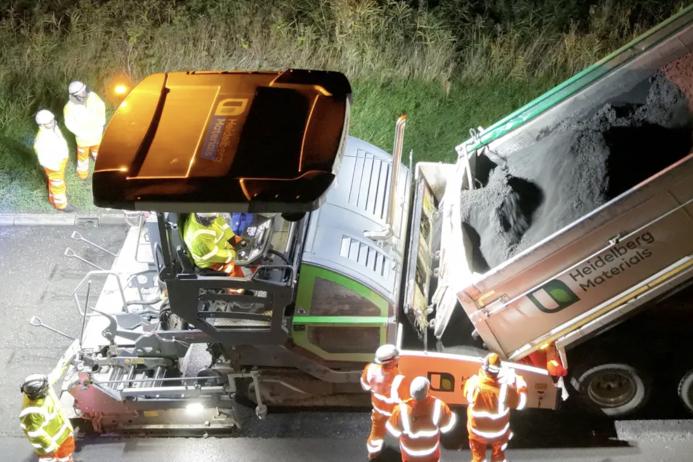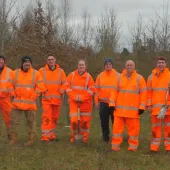Paving the way to low-carbon highways
Heidelberg Materials resurface stretch of A47 using recycled materials and electric machinery
A PROJECT to resurface a stretch of road in East Anglia using recycled materials and electric machinery is smashing low-carbon targets.
National Highways tasked its contractor Heidelberg Materials and WSP to deliver resurfacing of the A47 between Acle and Great Yarmouth, Norfolk, in a low-carbon way. The result is a new structural layer of the road that is made from more than 90% recycled materials.
With Heidelberg Materials’ recycling plant close to site, the project is predicted to save 400 tonnes of CO2 on what would previously have been emitted.
Alice Grandidge, project manager for the scheme at National Highways, said: ‘This scheme presented the ideal opportunity to resurface a road effectively but in a low-carbon way – from the material we used, where we sourced it from, how we mixed it, and when we worked on it.
‘All these aspects combined saved carbon compared with a traditional approach to a road resurfacing scheme – making it one of the greenest major road resurfacing projects and a major step towards carbon-zero highways.’
Scott Cooper, managing director of contracting at Heidelberg Materials, said: ‘This scheme is a great example of the effectiveness of supply chain collaboration in driving carbon reduction measures.
‘The change in design specification to use evoBuild foamed asphalt resulted in a dramatic increase in recycled content and provided substantial savings in CO2 emissions compared with using hot-mix asphalt.
‘In addition, the extensive use of electric plant demonstrated what the future of road laying could look like. The project is an excellent example of sustainable highway construction in practice.’
Dermott Doyle, technical director at WSP, commented: ‘Delivering infrastructure that balances operational excellence with low-carbon impact is a key priority for WSP.
‘On the A47 project, we worked closely with National Highways and Heidelberg Materials to design a major pavement intervention that maximizes recycled content and reduces carbon emissions, demonstrating how sustainable practices can be integrated into everyday road construction.’
evoBuild foamed asphalt – a cold recycling bound material (CRBM) – is a sustainable paving material made from the recycling of existing road materials such as asphalt and concrete.
The process takes the ‘old’ material, crushes it into aggregate and injects air and water to produce a new foamed bitumen. The result is a sustainable, durable, weather-resistant material that offers an environmentally friendly alternative to traditional road construction materials.
Additionally, a low-carbon recycling plant close to the A47 was used, which further helped save carbon due to the short distance from the plant to the resurfacing site. Moreover, electrified pavers and rollers etc were also used, along with low-carbon low-loader transport.
A47 low-carbon construction – key facts and figures:
Projected carbon savings exceed 400 tonnes of CO2
Increased use of recycled materials by more than 13,500 tonnes
Textbook example of the circular economy in practice each shift
2,400 tonnes of tar-bound material recycled, preventing its disposal in specialist landfill sites
Eliminated the need for large volumes of virgin aggregate, especially critical in a region with limited local geological availability
Cold-mix recycling plant situated close to site (eight miles away) reducing transport distances and associated carbon (16 miles closer than asphalt supply plant)
Work was carried out overnight between May and November 2025.










